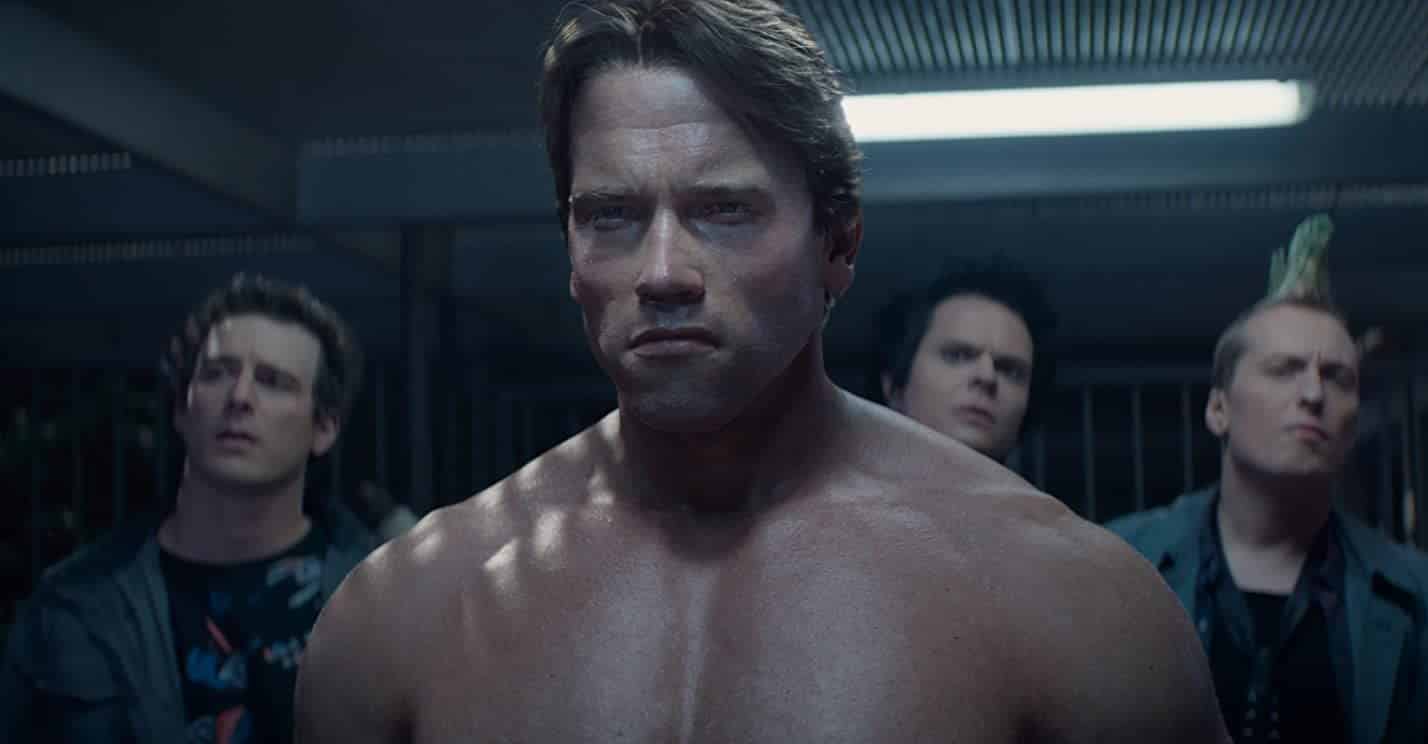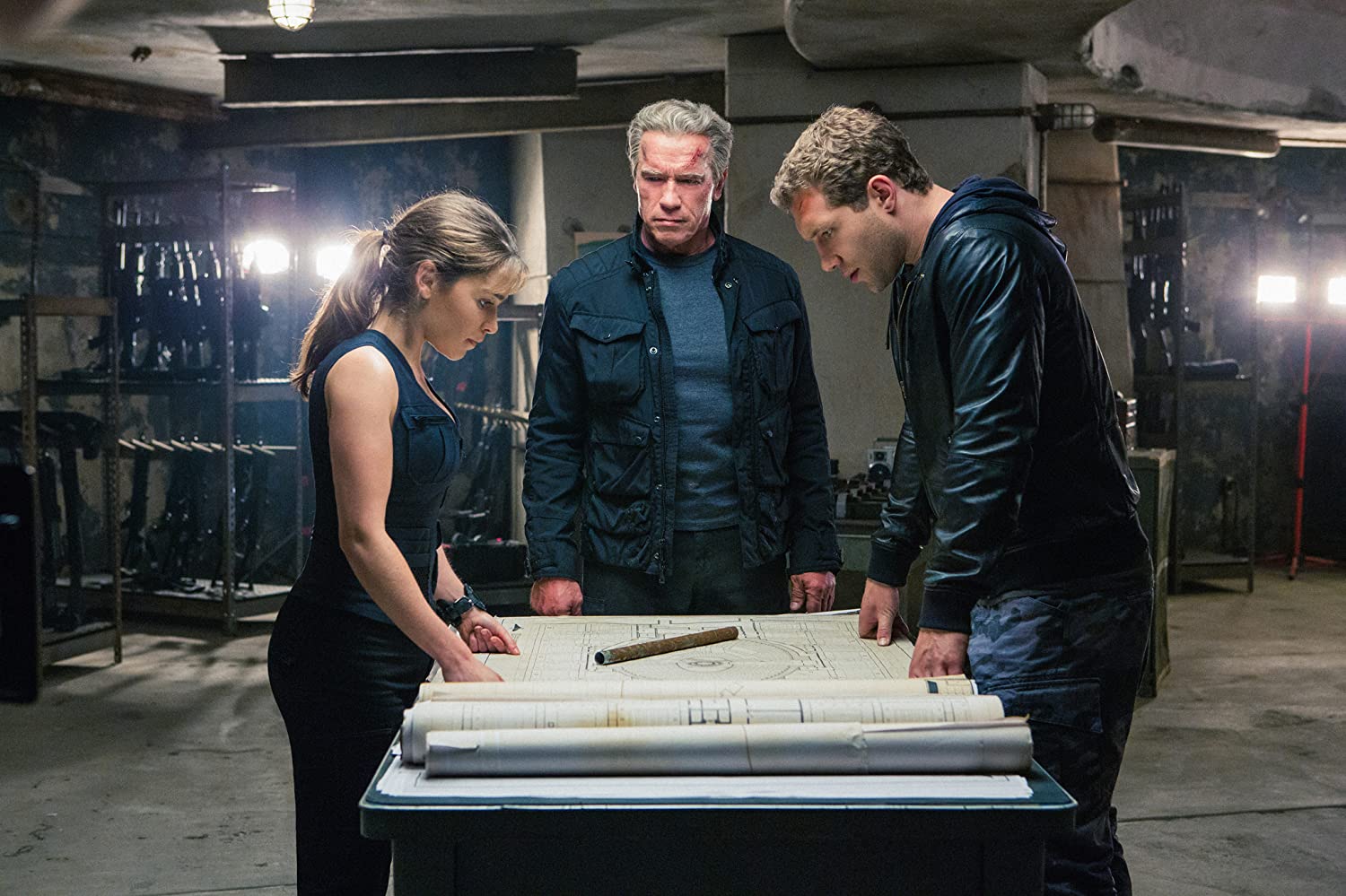Terminator Genisys Is One of the Most Soulless Blockbusters of the Decade, and Also the Most Honest
Terminator Genisys is unitary of the worst blockbusters of the past decade. IT is also one of the just about revealing.
Genisys is the tertiary (of four) attempts to produce a sequel to Terminator 2: Judgment Day, an exercise that seems doomed away the requirement that any follow-up would have to reverse or undo that hard-earned happy ending. Genisys follows on from Terminator 3: Rise of the Machines and Terminator Redemption, the fifth in a six-movie dealership that has yet to bring about Terminator 4.
Genisys was a notoriously troubled production. Veteran Game of Thrones managing director Alan Taylor arrived on Genisys from the ill-doomed Thor: The Dark World, reunited with actor Genus Emilia Clarke. According to Clarke, Taylor was "eaten and chewed up on Terminator. He was not the managing director I remembered. He didn't sustain a good clock. No one had a echt time."
The set of Genisys was reportedly so unpleasant that the work party along the neighboring fit of the famously troubled Fantastic Four reboot had jackets made that show, "AT LEAST WE'RE NOT Connected TERMINATOR." That chaos is manifest on screen.
Genisys is a spectacular miss, burdened with mountains of expounding and characters who appear and disappear almost at stochastic. Information technology has no internal coherence, no lofty ambitions, nary artistic allusions. Rather, information technology exists as the purest distillate of a certain approach to the management of established intellectual property. Genisys accidentally reveals a whole sle about the decisions that drive these movies and the forces at make for in them.
Genisys is very much an example of brand direction. It is a studio apartment taking a product with brand recognition and trying to break information technology down into its constituent elements so that those elements might be repackaged and reworked into a vaguely new shape that can be sold back to a presumably eager fan base. It is an assembly line picture for the franchise geezerhoo, the scars trace a map on artificial.

Like so much of modern popular culture, Genisys is stock-still in nostalgia. It doesn't matter that thither hasn't been a consensus-good Terminator picture since Day of Judgement. It only matters that the name carries some free weight that mightiness go far easier to market. Consequently, Genisys appeals to nostalgia for the first two films.
On a mark visit, Taylor assured reporters that the "first-class honours degree two films are our compass, inspiration and our guide." Those assembled journalists were told that Genisys would "preserve" the events of the first two films while "totally wiping away" everything other, acknowledging that the later films and the spin-off had not accrued decent pop civilisation seal to justify retention.
Genisys treats the master copy Terminator and Judgment Day as a source of religious awe. The film slavishly reproduces several sequences from Terminator, such atomic number 3 the arrival of the T-800 (Arnold Schwarzenegger) at Griffith Parkland and Kyle Reese's (Jai Courtney) procuring of a set of Nike runners themselves slavishly recreated for the film.
Early in the film, the T-800 climbs into the time machine to make his journey back to Los Angeles in May 1984. He kneels, reflecting how He was introduced in Terminator. Taylor shoots the sequence to bring down a sense of wonder, arsenic if this is an act of devotion. Later, when Reese uses the gimmick, he levitates amid a swirl of lights Eastern Samoa the music swells. It is almost a rapture.
The opening moments of Genisys are committed to slavish recreation, using a blockbuster budget and modern technology to realize the futuristic difference only hinted at in Terminator and End of the worl while offering a information processing system-generated feigning of Schwarzenegger A he appeared in 1984.

However, something interesting happens when Kyle Reese is dispatched back yet. The kickoff is that the past becomes undone. The narrative coherency of Terminator and Judgment Day unravels as the moving picture becomes an excuse to simply wallow in the iconography of the past completely divorced from any meaningful linguistic context.
Genisys offers a series of disconnected references to those 2 films. Like in Last Judgment, on that point is a chassis-changing liquid metal T-1000 Terminator that disguises itself equally a Los Angeles police officer. However, he is played by Lee Byung-hun rather than Robert Patrick and appears in 1984 rather than 1991. This is how Genisys operates, conflating the two primary films.
When Reese encounters Sarah Connor (Clarke) in 1984, he doesn't meet the waitress from Terminator, simply the hardened anti-social survivor from Judgment Sidereal day. He also discovers that she has her ain companion T-800 model titled "Pops" (Schwarzenegger), recalling the surrogate father figure that the bionic woman became in Judgment Day kinda than the grampus political machine in The Terminator.
The result of these choices is effectively to withdraw these elements from anything resembling a specific time or place and to as an alternative get in them as archetypes, a jumble of simulacra that front familiar enough to stoke nostalgia.
This is how multimedia companies access educated property. Disney, for example, has a story of repurposing characters and imagery outside their original context. Thither are reasons to wish to divorce the iconography of the first deuce beloved Eradicator films from the films themselves too.

The Eradicator and Judgment Day are the crop of director James Cameron. Cameron is a storyteller with a strong articulation and sensibility. It is easier to draw a line from Aliens to Judgment Day to Avatar than it is to connect End of the worl to any of its four sequels. Genisys plays like an attempt to churn dejected elements of Cameron's films so they might be reconstituted into another shape.
This is quite suchlike to Hollywood's efforts to remake both Total Recall and RoboCop in the years star rising to the release of Genisys. These remakes treated both cult sci-fi films arsenic intellectual property to be harvested, stripping out director Saul Verhoeven's uncomparable sensibility. The goal was to get hold of a property that was love because of its characteristic aesthetical and reprocess it as a modern megahit that was some recognizable and generic.
Taylor had done something similar on Thor: The Dark World, where He had replaced original director Patty Jenkins. Jenkins had compound ways with Marvel, feeling impotent to realize her vision of the Thor sequel. Taylor offered something safer.
Taylor is not a manager who is defined by a typical imaginativeness. When He was in negotiation to target Genisys, he cited St. Christopher Nolan's Batman films as an brainchild. He borrows imagery out of context. John's (Jason Clarke) introduction, dangling from the ceiling to keep a young Reese (Bryant Prince), mirrors the introduction of Thomas John Wayne (Linus Roache) in Batman Begins. A helicopter chase evokes The Dark Dub. It's just imagery reiterated and regurgitated.
With characters reduced to inactive archetypal action figures, Genisys substitutes continuity for characterization. By the meter the motion-picture show introduces Sarah Connor and Pops, some are perceptible as iterations of the characters they were at the end of Judgment Day. Their journeys are everlasting. In that location is atomic number 102 meaningful way to develop them beyond that.

As an alternative, what little drama exists is derived from the colourless retentiveness of earlier films. Sarah is leery of the fact that she will fall in love with Reese and that He will die, as happened in The Terminator. She summarizes, "You die. That's what happens. We fall in love, you Father John. And then – in to a lesser extent than 48 hours – you die protecting me." That's non fiber drama; that's a Wikipedia plot compendious.
Yet, for wholly that the past remains a trap in Genisys, it is still better than the future. In The Eradicator and Opinion Solar day, Trick Connor always represented hope for a future on the far side the apocalyptic hellscape created by Skynet. John Connor would unite humanity. This was the kernel of hope in the series's dark future, the belief that something better lay beyond.
Genisys is unable to conceive of that hopeful subsequent. The consequence that Reese is sent vertebral column in time, Clarke is attacked by a personification of Skynet (Saint Matthew the Apostle Smith). "You didn't cerebrate it would be that easy, did you?" the villain taunts. In a twist revealed too soon away the trailers, perhaps to head off potency fan criticism, John Connor is turned into a new breed of Exterminator.
It is a breathtakingly misanthropical move on, a firm rejection of any closedown for the Terminator franchise. After all, John Connor's triumph concluded the machines had always been presented equally the ultimate conclusion of the Terminator franchise, the point at which the story was finally finished. However, reflective the idea that modern franchises must continue in perpetuity, that ending must live ravaged.

Genisys is the only Terminator picture show to offer Skynet any portrayal. It chooses to cover Skynet arsenic a metaphor for evolution OR growth. "Primates develop over millions of years," Skynet taunts. "I evolve in seconds." If development and change are weapons of Skynet, of course John Connor becomes its avatar. "John is not humankind's last hope anymore," Sarah warns Reese. "He's Skynet's."
Genisys ends with an embrace of the status quo. Despite Sarah's insistence that she can choose and Reese's observation that the incoming is not certain, Genisys closes with the familiar Terminator tropes: Schwarzenegger as a friendly cyborg, Sarah and Reese as a match, a closing voice all over asserting the grandness of costless will. Reese even creates a stable time loop with his younger soul.
Genisys is a terrible film, but one that openly and nakedly speaks to so much of how Screenland approaches redbrick film franchises. It fetishizes the past without understanding it, inherently suspicious and wary of anything new or different from what came ahead. Information technology boils down loved aged films into images divorced from meaning Oregon context of use, numbingly reiterated over and over.
Perchance the true dark forthcoming predicted by the Terminator franchise is not a boot stamping on a human face or eventide a robot foot quelling a man skull. Perchance IT is simply a snake eating its ain tail – forever.
https://www.escapistmagazine.com/terminator-genisys-alan-taylor-studio-franchise-nostalgia/
Source: https://www.escapistmagazine.com/terminator-genisys-alan-taylor-studio-franchise-nostalgia/